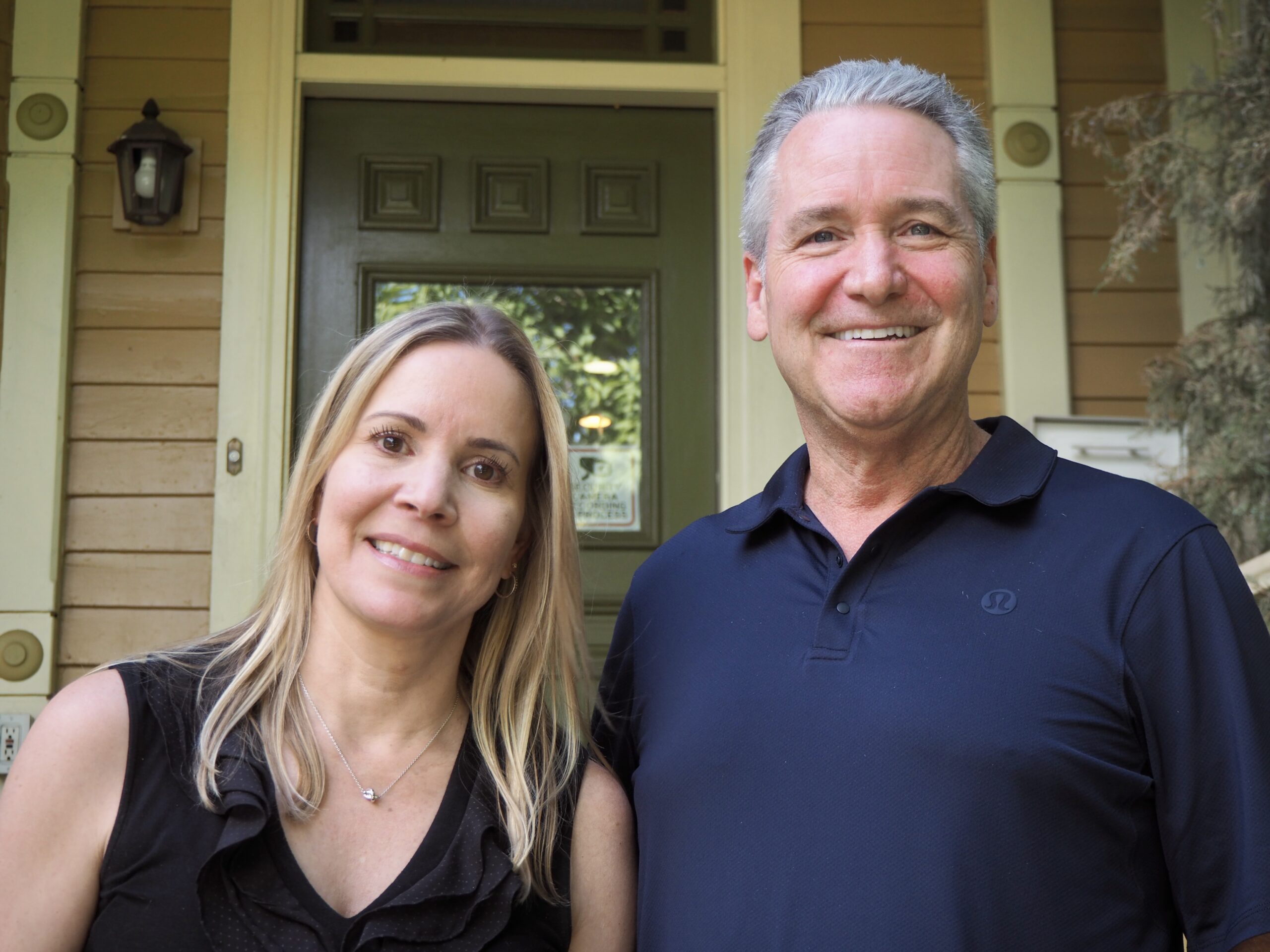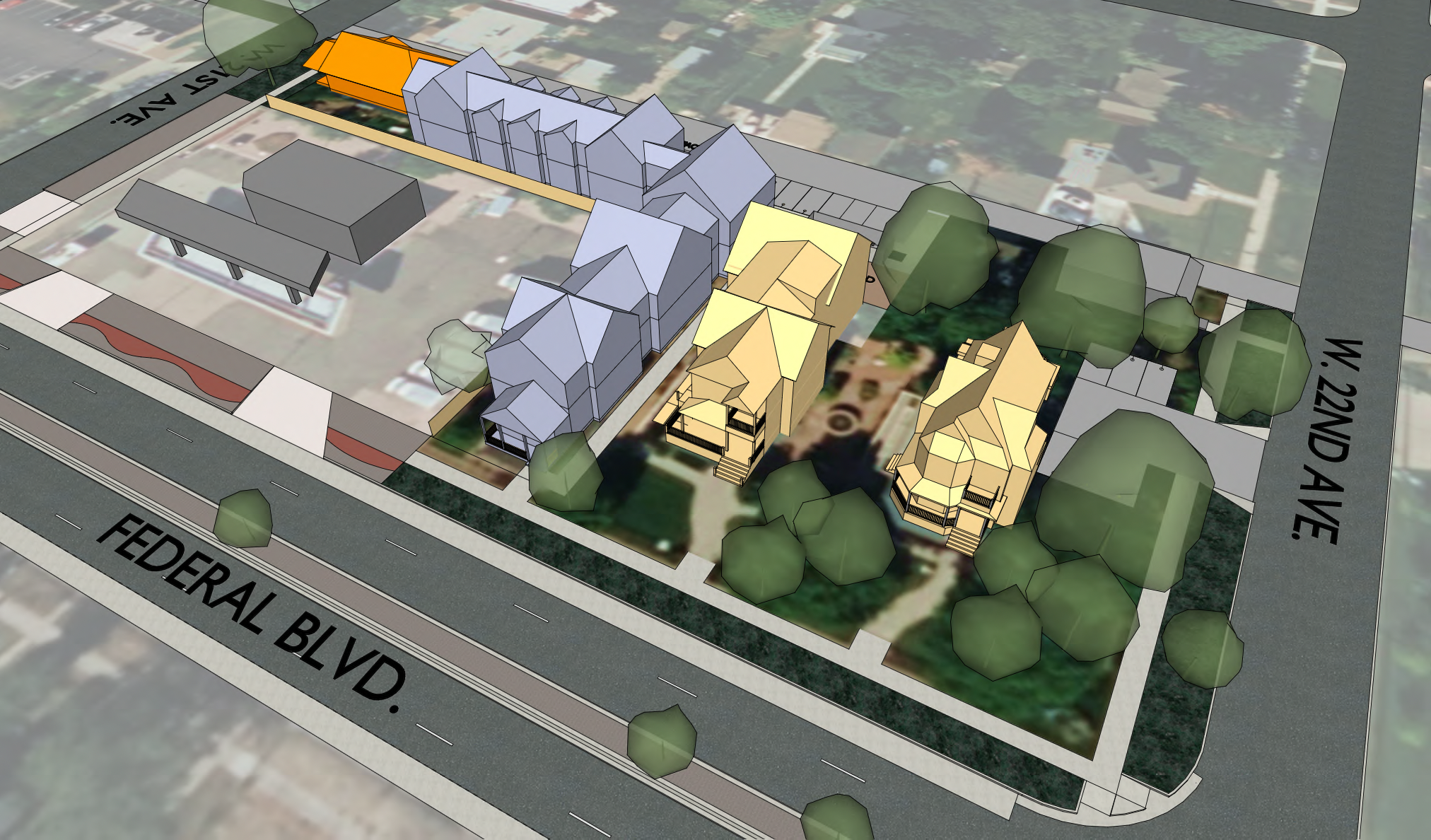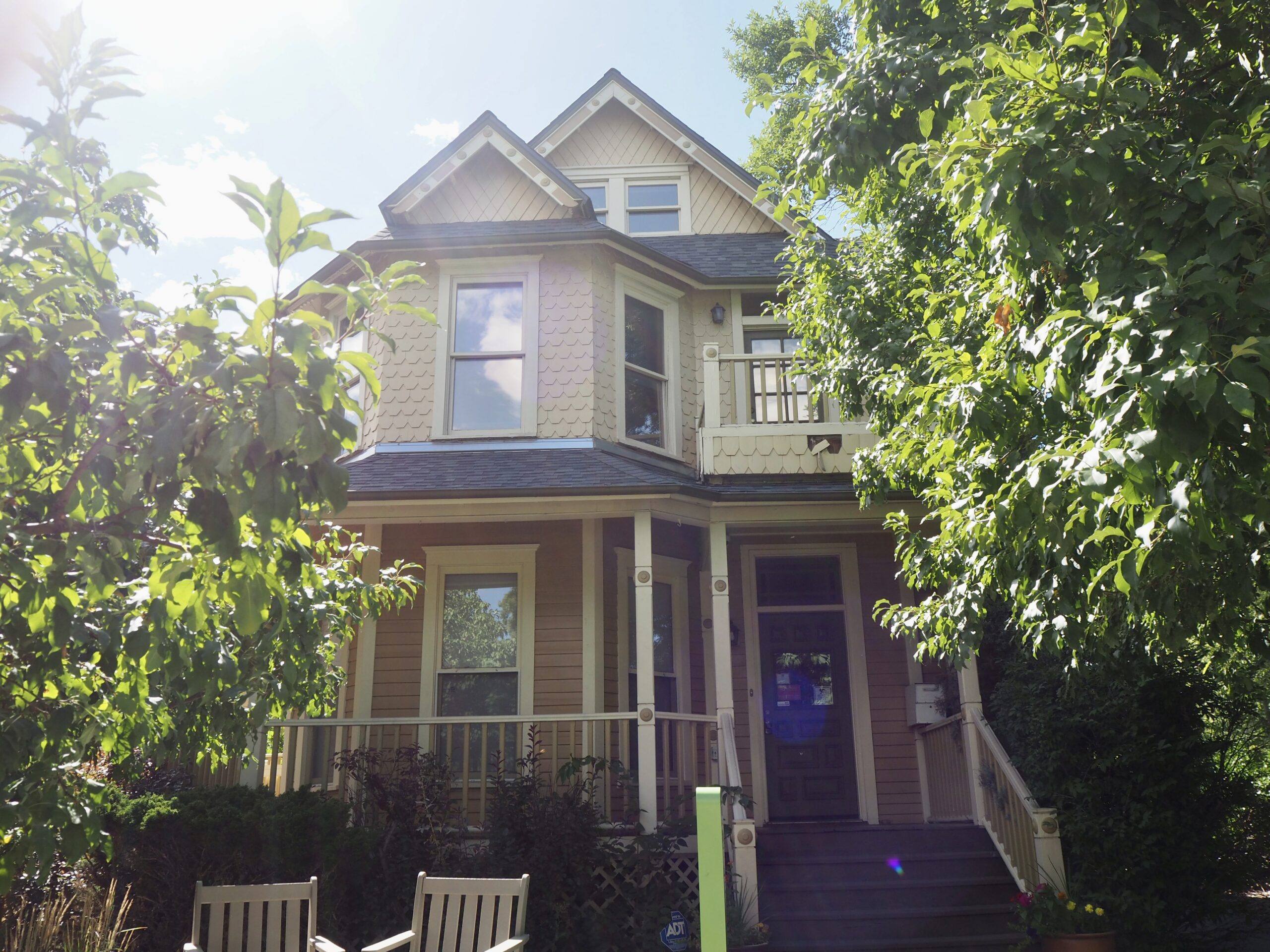
Denver Child Advocacy Center Executive Director Angela Davidson, left, and board member Matt Hogan stand in front of a DCAC building. Davidson is a psychologist who moved to Denver around 2000 and hails from Colombia. Hogan, a native Denverite, is a partner with the law firm Sherman & Howard. (Matt Geiger/BusinessDen)
A Denver nonprofit that provides services for abused children is working through a real estate puzzle on Federal Boulevard near Mile High Stadium.
“It has to do with building capacity. I mean, I wish we didn’t have this need … The volume of both sexual abuse and physical abuse (of) kids is greater than we can accommodate,” said Matt Hogan, who sits on the board of directors for the Denver Children’s Advocacy Center.
The DCAC, which has been on Federal since the early 2000s, is situated in 12,300 square feet across three adjacent buildings at 2125, 2139 and 2149 Federal Blvd. It bought them between 2004 and 2012 for a combined $960,000, records show.
The group is proposing to construct a roughly two-story, 12,400-square-foot L-shaped building so it can offer its services to more people and bring more of its partners onto the campus.
It would need to purchase a fourth building, 3025 W. 21st Ave., to make that a reality. But the fact that all the buildings are located inside of a historic district, where changes to contributing buildings must be approved by Denver’s Landmark Preservation Commission, could complicate the plans.
“There’s so many steps, and the challenge here is the correct sequence of events,” Hogan said. “For example, we need to buy this house, and we’ve had conversations with the owner and we’ve negotiated terms and seemingly we’re on the same page … We’re a little shy about closing on a house where Landmark says the whole thing’s off.”
Hogan has had “lengthy discussions with the folks at Landmark,” but that doesn’t guarantee the success of the proposal.

A view of the proposed development from the northeast. The buildings in light yellow are existing DCAC spaces, the blue structure is the proposed addition, and the orange home is the property they will need to buy. Also on the block is a gas station at the corner of 21st and Federal, shown in grey. (Public records)
If the concept moves forward, the tentative plan is to start the structure at 3025 W. 21st Ave., connecting to the historic home located there. The building would stretch through the long backyard, before turning 90 degrees to the east and either connecting to — or demolishing and replacing — the 2125 Federal Boulevard. space.
A playground would be relocated and 22 new parking spaces would be installed along the alleyway between 21st and 22nd Avenues. DCAC currently has 18 spaces between two lots.
Hogan said it’s too early to talk about the cost of the project, but that DCAC would expect to undertake a capital campaign to raise funds.
Long before DCAC had grand visions of a sophisticated campus, the block was a collection of derelict homes. The first building the nonprofit purchased there was a “dilapidated house” on the corner of 22nd and Federal in 2004. Before then, the group operated in half of a duplex on Bail Bonds Row in the Golden Triangle.
The nonprofit has three main lines of programming: its “rapid response” team of forensic interviewers and victim advocates that assist children and law enforcement in the immediate aftermath of an incident, a therapy wing and an outreach arm.
“We got that first house built, and then there was continued need for space to do these forensic interviews. We could do some in that house, but it just wasn’t enough space. So we buy this house (2139 Federal), and it was a flop house,” Hogan said.
“Touring this place, we’re down in the basement, it looked like Guantanamo Bay. It had this big, weird, concrete, naked cherubs fountain. It was probably like 7 feet tall, in the front … I’m not sure that’s quite the image we’re looking for, given what we do.”

The DCAC purchased the building at 2149 Federal Blvd. in 2004 for $395,000, when it was “relatively dilapidated,” said Matt Hogan, a board member. It’s one of three adjacent buildings the nonprofit owns. (Matt Geiger/BusinessDen)
The house was fixed up, and a few years later, the group purchased 2125 Federal and built another structure there. The DCAC intentionally bought homes, or constructed buildings to resemble them, in order to help put children at ease.
“Everything is done to be child-friendly or family-friendly, and not institutional,” said Angela Davidson, executive director of the nonprofit.
Per its annual report last year, the DCAC served almost 1,700 children, two-thirds of them girls. The most common age group assisted were those between 7 and 12 years old, although one-third of kids were between 13 and 17 and a quarter were 6 and under. About half were Hispanic.
The group had revenue of nearly $3 million to $4 million in 2023, with expenses a little over $3 million, according to the report. Private grants and foundations provided the bulk of revenue.
“Before the advent of advocacy centers, you would have a poor kid who’s been abused, and they would end up talking to a police officer … Then that might go to the detective. Then it could go to the district attorney … And the problem with it, of course, is this kid is dealing with one of the most traumatic things that anybody can imagine, and to have to repeat the same story over and over again is just horrendously re-traumatizing,” Hogan said.
The DCAC offers therapy to victims and non-offending family members. Last year, over 5,800 therapy sessions were held for almost 700 people.
“We work really hard to see the families at no cost … for as long as they need to be in treatment,” Davidson said.

Denver Child Advocacy Center Executive Director Angela Davidson, left, and board member Matt Hogan stand in front of a DCAC building. Davidson is a psychologist who moved to Denver around 2000 and hails from Colombia. Hogan, a native Denverite, is a partner with the law firm Sherman & Howard. (Matt Geiger/BusinessDen)
A Denver nonprofit that provides services for abused children is working through a real estate puzzle on Federal Boulevard near Mile High Stadium.
“It has to do with building capacity. I mean, I wish we didn’t have this need … The volume of both sexual abuse and physical abuse (of) kids is greater than we can accommodate,” said Matt Hogan, who sits on the board of directors for the Denver Children’s Advocacy Center.
The DCAC, which has been on Federal since the early 2000s, is situated in 12,300 square feet across three adjacent buildings at 2125, 2139 and 2149 Federal Blvd. It bought them between 2004 and 2012 for a combined $960,000, records show.
The group is proposing to construct a roughly two-story, 12,400-square-foot L-shaped building so it can offer its services to more people and bring more of its partners onto the campus.
It would need to purchase a fourth building, 3025 W. 21st Ave., to make that a reality. But the fact that all the buildings are located inside of a historic district, where changes to contributing buildings must be approved by Denver’s Landmark Preservation Commission, could complicate the plans.
“There’s so many steps, and the challenge here is the correct sequence of events,” Hogan said. “For example, we need to buy this house, and we’ve had conversations with the owner and we’ve negotiated terms and seemingly we’re on the same page … We’re a little shy about closing on a house where Landmark says the whole thing’s off.”
Hogan has had “lengthy discussions with the folks at Landmark,” but that doesn’t guarantee the success of the proposal.

A view of the proposed development from the northeast. The buildings in light yellow are existing DCAC spaces, the blue structure is the proposed addition, and the orange home is the property they will need to buy. Also on the block is a gas station at the corner of 21st and Federal, shown in grey. (Public records)
If the concept moves forward, the tentative plan is to start the structure at 3025 W. 21st Ave., connecting to the historic home located there. The building would stretch through the long backyard, before turning 90 degrees to the east and either connecting to — or demolishing and replacing — the 2125 Federal Boulevard. space.
A playground would be relocated and 22 new parking spaces would be installed along the alleyway between 21st and 22nd Avenues. DCAC currently has 18 spaces between two lots.
Hogan said it’s too early to talk about the cost of the project, but that DCAC would expect to undertake a capital campaign to raise funds.
Long before DCAC had grand visions of a sophisticated campus, the block was a collection of derelict homes. The first building the nonprofit purchased there was a “dilapidated house” on the corner of 22nd and Federal in 2004. Before then, the group operated in half of a duplex on Bail Bonds Row in the Golden Triangle.
The nonprofit has three main lines of programming: its “rapid response” team of forensic interviewers and victim advocates that assist children and law enforcement in the immediate aftermath of an incident, a therapy wing and an outreach arm.
“We got that first house built, and then there was continued need for space to do these forensic interviews. We could do some in that house, but it just wasn’t enough space. So we buy this house (2139 Federal), and it was a flop house,” Hogan said.
“Touring this place, we’re down in the basement, it looked like Guantanamo Bay. It had this big, weird, concrete, naked cherubs fountain. It was probably like 7 feet tall, in the front … I’m not sure that’s quite the image we’re looking for, given what we do.”

The DCAC purchased the building at 2149 Federal Blvd. in 2004 for $395,000, when it was “relatively dilapidated,” said Matt Hogan, a board member. It’s one of three adjacent buildings the nonprofit owns. (Matt Geiger/BusinessDen)
The house was fixed up, and a few years later, the group purchased 2125 Federal and built another structure there. The DCAC intentionally bought homes, or constructed buildings to resemble them, in order to help put children at ease.
“Everything is done to be child-friendly or family-friendly, and not institutional,” said Angela Davidson, executive director of the nonprofit.
Per its annual report last year, the DCAC served almost 1,700 children, two-thirds of them girls. The most common age group assisted were those between 7 and 12 years old, although one-third of kids were between 13 and 17 and a quarter were 6 and under. About half were Hispanic.
The group had revenue of nearly $3 million to $4 million in 2023, with expenses a little over $3 million, according to the report. Private grants and foundations provided the bulk of revenue.
“Before the advent of advocacy centers, you would have a poor kid who’s been abused, and they would end up talking to a police officer … Then that might go to the detective. Then it could go to the district attorney … And the problem with it, of course, is this kid is dealing with one of the most traumatic things that anybody can imagine, and to have to repeat the same story over and over again is just horrendously re-traumatizing,” Hogan said.
The DCAC offers therapy to victims and non-offending family members. Last year, over 5,800 therapy sessions were held for almost 700 people.
“We work really hard to see the families at no cost … for as long as they need to be in treatment,” Davidson said.


